J'ai vu à la foire une femme nue marcher au plafond
J'ai vu à la foire une femme nue marcher au plafond ("I've seen at the fair a naked woman descending from the ceiling") is an original drawing realized by Jean Cocteau in 1927. It is a unique piece and it is not signed. The artwork is made with ink and watercolor. Reproduced in the play by Jean Cocteau "La Machine Infernale", ed. Grasset, 1934. The artwork is from the Pecci Blunt Collection; the original stamp of the Pecci Blunt collection appears on the lower left margin. The surface presents some folds and rips; the sheet is affixed to the cardboard.
Jean Cocteau (Yvelines, 1888 – Essonne, 1963) was a French painter, poet, designer, playwriter, and filmmaker. Cocteau is one of the most important figures of French Surrealism.
J'ai vu à la foire une femme nue marcher au plafond ("I've seen at the fair a naked woman descending from the ceiling") is an original drawing realized by Jean Cocteau in 1927. It is a unique piece and it is not signed. The artwork is made with ink and watercolor . Reproduced in the play by Jean Cocteau "La Machine Infernale", ed. Grasset, 1934. The artwork is from the Pecci Blunt Collection; the original stamp of the Pecci Blunt collection appears on the lower left margin. The surface presents some folds and rips; the sheet is affixed to the cardboard.
The particular composition of this image gives to the scene a strong sense of movement, which is also emphasized by the poses of the figures. The sketch was realized by Jean Cocteau for "La Machine Infernale", a French play of 1932 based on the ancient myth 'Oedipus'. The play was premiered at the Theatre Louis Louvet in Paris, France, in 1934. On the lower right margin, "J'ai vu un femme nue marcher au plafond" is written in ink. In the center of the composition, a naked man is represented. On the left side, there is a sketch of a horse; on the right side, a naked female figure is falling from the ceiling. Jean Cocteau was not only an important poet and playwriter, but also a great designer and artist. The writer André Fraigneau observes that “in chronological order, the designer Cocteau precedes the poet Cocteau". As a matter of fact, since his childhood, Cocteau has demonstrated the precocious bloom of his talent for drawing.
Jean Cocteau (Yvelines, 1888 – Essonne, 1963) was a French painter, poet, designer, playwriter, and filmmaker. Cocteau is one of the most important figures of French Surrealism. He was born to a socially prominent Parisian family. His father George Cocteau was an amateur painter who committed suicide when Jean was only a child. He soon became famous in Bohemian circles as The Frivolous Prince. In 1912, he collaborated to the Ballets Russes. After World War I, Cocteau met the poet Guillaume Apollinaire and the artist Pablo Picasso. In 1917, thanks to Sergei Diaghilev, a Russian impresario, Cocteau wrote a scenario for the ballet “Parade”; the backscene of this important ballet was realized by Pablo Picasso and the music was composed by Erik Satie. He always denied being in any way connected to the movement. In the late 1920s, Cocteau wrote the libretto for Igor Stravinsky’s opera-oratorio Oedipus Rex. In 1918, he met the French poet Raymond Radiguet. They worked and went on many journeys together. Cocteau promoted his friend's works in his artistic group. Cocteau is well-known for his novel Les Enfants Terribles (1929) and the films The Blood of a Poet , Beauty and the Beast , and Orpheus . During World War II, he invented sets for the Théâtre de la Mode. In 1955, Cocteau was elected member of the Académie française and The Royal Academy of Belgium. He was commander of the Legion of Honor, Member of the Mallarmé Academy, German Academy (Berlin), and American Academy.
| SKU | J-45421 |
|---|---|
| Artista | Jean Cocteau |
| Typology | Original Drawings |
| Technique | Drawing-Ink, Watercolour |
| Periodo | 1920s |
| Conditions | Good (minor cosmetic wear) |
| Dimensioni (cm) | 26.7 x 0.1 x 20.8 |







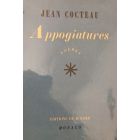
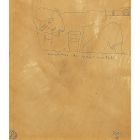

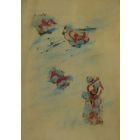
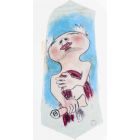

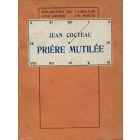
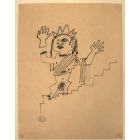
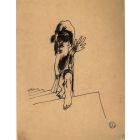
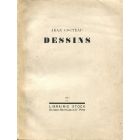
Validate your login